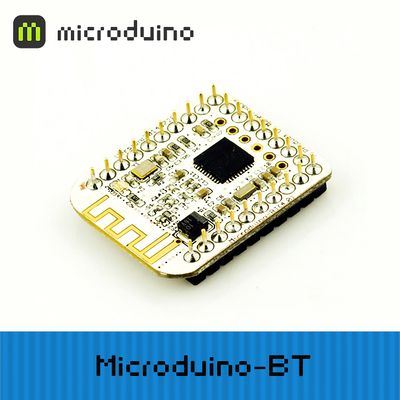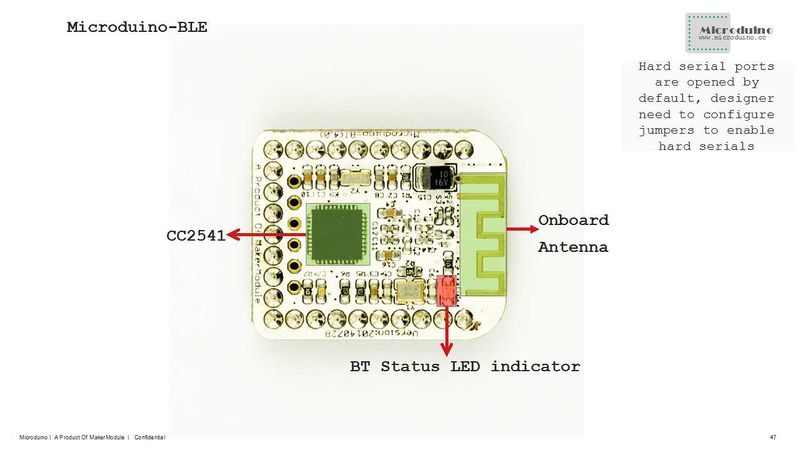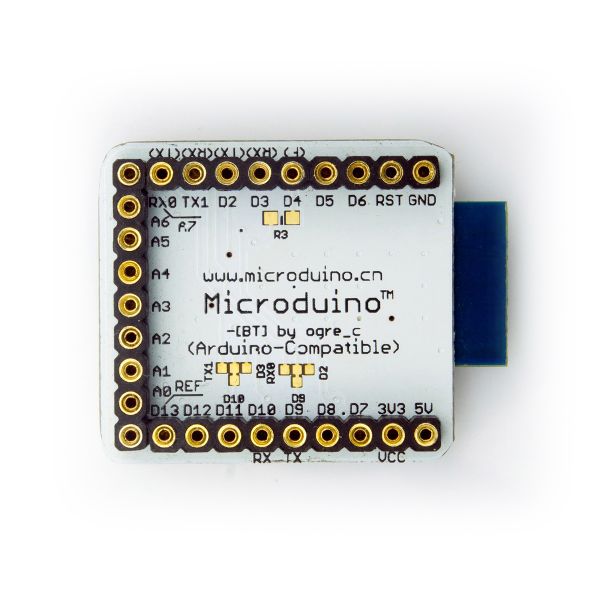|
Microduino-BT is a BLE serial transparent transmission module based on CC2541 chip. It is custom-made for U-shaped 27PIN standard interface of Microduino. The old version can refer to Microduino-【BT】.
Features
- Adopt Microduino UPIN27 standard interface, working by stacking with other Microduino modules;
- Adopt TI CC2541 chip with low consumption;
- Support iBecons mode;
- Multiple ways to restore factory settings;
- Use “AT+ RENEW\r\n” instruction to restore;
- Test pin DEF to GND and then power on the module. The LED light blinks after LED1 keeps on for three seconds and meantime, loose DEF and factory reset succeeds, you can see the LED light blinks every one second.
- Capable of data power-off preservation function;
- Support AT instruction and flexible to change serial baud rate, device name, code matching as well as other parameters according to various needs;
- Small, cheap, stackable and open source;
- Open source hardware circuit design and Arduino compatible programming development environment;
- Uniform Microduino interface standard and rich external modules, flexible to connect with other Microduino modules and sensors;
- 2.54 pin pitch interface makes it easy to be integrated to pegboard.
Specification
- Way of Communication: Serial port transmission and the default serial port is D4(RX), D5(TX);
- Power Supply: +3.3VDC 50mA;
- Bluetooth Protocol: Bluetooth Specification V4.0 BLE;
- Service Support: Central & Peripheral UUID FFE0,FFE1;
- Frequency: 2.4GHz ISM band;
- Way of Modulation: GFSK(Gaussian Frequency Shift Keying);
- Transmit Power: ≤4dBm;
- Flexibility: ≤-84dBm at 0.1% BER;
- Transmission Rate:
- Asynchronous: 6 kbps;
- Synchronous: 6 kbps;
- Status Indicator:
- Before connection:
- Host machine indicator keeps on for 100ms every second when not recording slave machine address;
- Host machine indicator keeps on for 900ms every second when recording slave machine address;
- Slave machine indicator keeps on for one second every two seconds.
**After connection:
- The indicator of both the host and the slave machine keeps on for 100ms every five seconds.
- During the transmission, each data package should include less than 120 bytes. The higher the baud rate is, the longer transmission interval is. There exists loss rate during Bluetooth data transmission. So users should be ready for re-transmission or data check.
- iBeacon has been integrated. Set by AT instruction “AT+MODE2\r\n” can be achieved only under slave machine.
Document
Eagle PCB File:Microduino-BT Shield.zip
Support AT instruction configuration/control: File:Microduino-BLE.pdf
Main Components
Android APP
Development
Serial Port Communication Requirements
- Default serial configuration is:
- Baud rate: 9600
- No check
- Data bit 8
- Stop bit 1
- For Arduino IDE serial monitor:
- Set to: “\r\n”、“9600baud”
- For other serial debugging software:
- Baud rate 9600
- No check
- Data bit 8
- Stop bit
Use PC to Debug
| Microduino-BT |
Microduino-USBTTL
|
| D4 |
TX1
|
| D5 |
RX0
|
| 3V3 |
3V3
|
| GND |
GND
|
Use USBTTL and Core to Download and Debug
- If it keeps using the default jumper (RX0、TX1):
- Unplug the Microduino Shield BT4.0 during downloading the program;
- If you want to change the jumper cables to meet your requirement, you need to cut the connection between two intermediate of the pad and RX0/TX1, and then connect them to D2, D3 (or D9, D10).
- If it needs to change the jumper, you can change the serial connection of Microduino Shield BT4.0 and Microduino Core from "TX-RX0、RX-TX1" to:
- TX-D2, RX-D3 (For Core+'s Serial1)
- TX-D9, RX-D10 (you can adopt SoftwareSerial libray to solve the problem)
Pin Description
| HM-10 module pin name |
Microduino pin |
Function
|
| TX |
RX0(orD2/D4) |
Serial sending pin(TTL level), capable of connection RXD od a microcontroller.
|
| RX |
TX1(orD3/D5) |
Serial receiving pin(TTL level), capable of connecting TXD of a microcontroller.
|
Application
Program Download
Program test: File:BLE debug uart1.zip,File:BLE LightBlue time.zip
Serial Port Debug Shield BT4.0 by CoreUSB
- Hardware: Microduino CoreUSB and Microduino BT;
- Software: Arduino IDE (version 1.0 or higher) and Microduino test program (Arduino end);
- Other conditions: Users can change the jumpers back of the module and change the serial port to RX0(D0) and TX1(D1);(Because CoreUSB can use USB to simulate 0(Serial), and RX0 and TX1 is the (Serial 1) of CoreUSB);
- Start Arduino IDE, open Microduino test program and choose Microduino-CoreUSB as the board and download directly;
- Check if the serial communication is OK or not:
- Send “AT”(with \r\n behind) after opening the serial monitor and if the return is “OK”, it means the configuration is successful.
Have serial debugging of BT module by uart1 of Core+
- Hardware: Microduino USBTTL, Microduino Core+ and Microduino BT;
- Software: Arduino IDE (version 1.0 and higher) as well as Microduino test program (Arduino end);
- Other conditions: Users can change the jumpers back of the module and change the serial port to D2 and D3;
- Start Arduino IDE, open Microduino test program and choose board Microduino Core+( Atmega644P@16M,5V) and download;
- Check the status of the serial communication:
- Send “AT”(with \r\n behind) after opening the serial monitor and if the return is “OK”, it means the configuration is successful.
Note:If you use Android device to debug, you need to make sure the system should be version 4.3 or higher so that Microduino-BT can be detected.
A simple test of Microduino-Shield BT4.0
FQA
- The module can't make pair with win7?
- Please check its version in win 7, which only support BLE 4.0 version and the default password is 000000.
- How to reset the module?
- You can adopt power-on reset or send AT instruction "AT+RESTART\r\n" through the serial port.
- It can't make pair with iPhoe or Android phones?
- This issue is mostly caused by the version of the BT. This module only supports BT4.0 protocol.
- For Andriod OS: 4.3 and higher
- For IOS: iPhone4s and higher, iPod Touch 5 and higher, iPad 3 and higer,iPad mini and higher.
Buy
History
- On July, 28, 2014, the module scheme was cancelled. The new BT version adopts CC25541 chip, supporting iBeacons mode. For the old version, you can refer to Microduino-【BT】.
- On June 5, 2014, the second proofing was finished, changing its name to Microduino-[BT] and addomg the third optional serial port—UART1. It is divided into two versions—version 2.1, a module used for HM09 and 4.0 version, a module used for HM10.
- On 10, May, 2013, the board design was finished.
|




